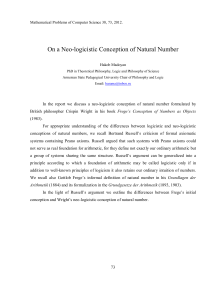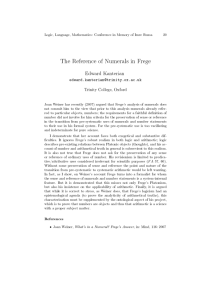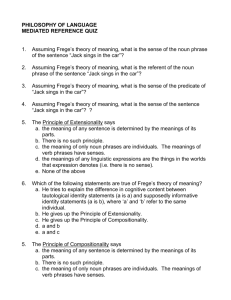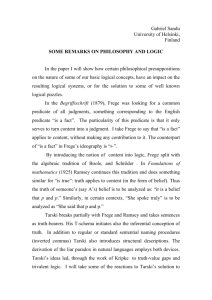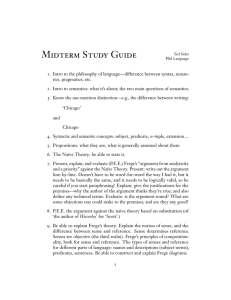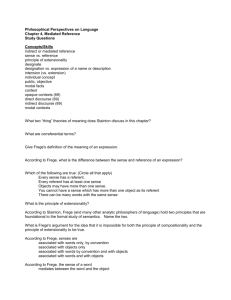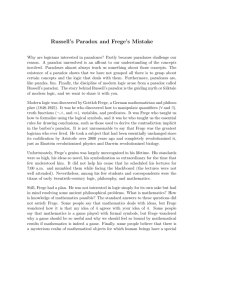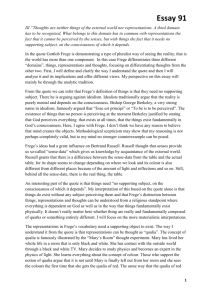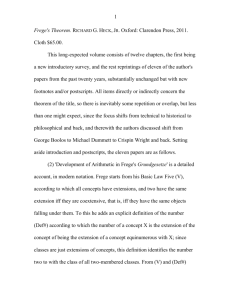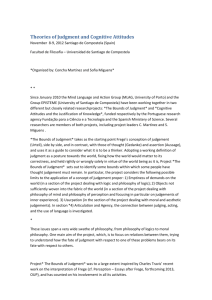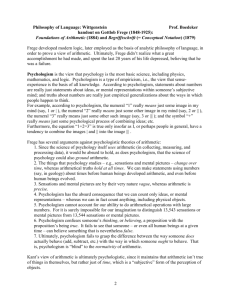FregeRussell
advertisement
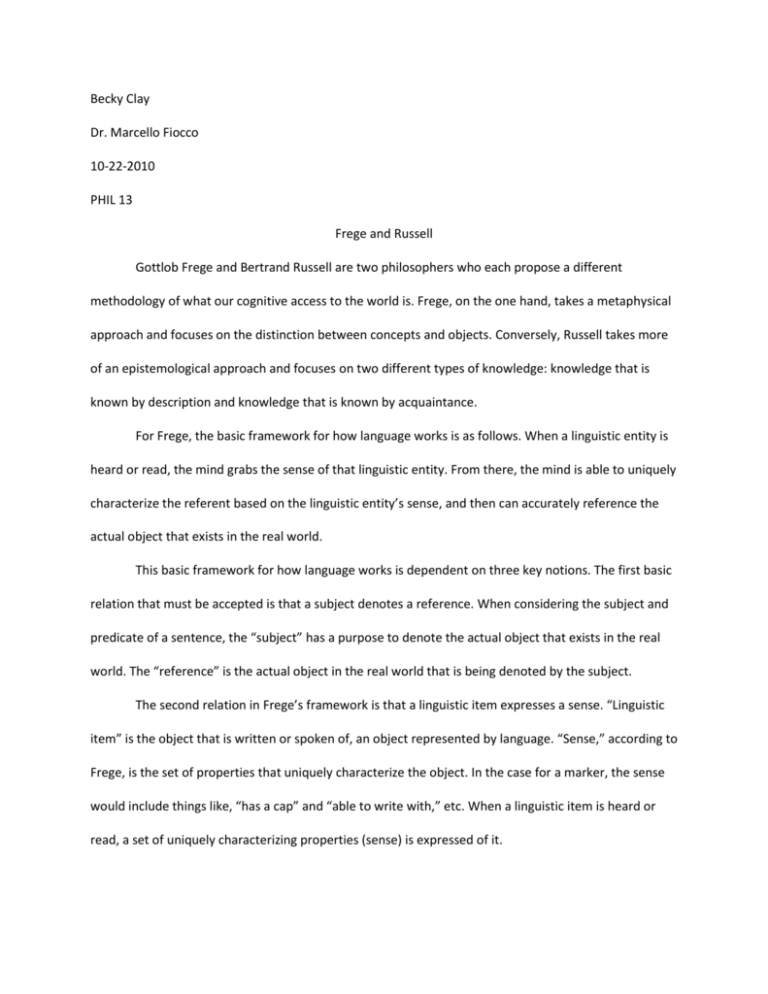
Becky Clay Dr. Marcello Fiocco 10-22-2010 PHIL 13 Frege and Russell Gottlob Frege and Bertrand Russell are two philosophers who each propose a different methodology of what our cognitive access to the world is. Frege, on the one hand, takes a metaphysical approach and focuses on the distinction between concepts and objects. Conversely, Russell takes more of an epistemological approach and focuses on two different types of knowledge: knowledge that is known by description and knowledge that is known by acquaintance. For Frege, the basic framework for how language works is as follows. When a linguistic entity is heard or read, the mind grabs the sense of that linguistic entity. From there, the mind is able to uniquely characterize the referent based on the linguistic entity’s sense, and then can accurately reference the actual object that exists in the real world. This basic framework for how language works is dependent on three key notions. The first basic relation that must be accepted is that a subject denotes a reference. When considering the subject and predicate of a sentence, the “subject” has a purpose to denote the actual object that exists in the real world. The “reference” is the actual object in the real world that is being denoted by the subject. The second relation in Frege’s framework is that a linguistic item expresses a sense. “Linguistic item” is the object that is written or spoken of, an object represented by language. “Sense,” according to Frege, is the set of properties that uniquely characterize the object. In the case for a marker, the sense would include things like, “has a cap” and “able to write with,” etc. When a linguistic item is heard or read, a set of uniquely characterizing properties (sense) is expressed of it. The third relation in Frege’s framework is that a sense determines a reference. The “sense” is still that set of uniquely characterizing properties of the object, and the “reference” is still the actual object in the real world. What Frege is trying to illustrate is that when a linguistic item is used, it expresses a sense of the object, which then allows us to accurately refer to the actual object that exists in the real world. It is by these connections that one’s reference to the world is not direct but mediated. A subject refers to a reference, but it is not until the sense of that subject is expressed that a referent can be determined. Sense is the mediator between one’s mind and the actual world. The metaphysical distinction that is the crux of Frege’s discussion “On Concept and Object” is that both concepts and objects are the connection between language and the world in which we live. The subject of a sentence is the “object,” and the predicate is the “concept.” As outlined in Frege’s basic framework, subjects denote a referent (object), linguistic items express senses (concepts), and senses determine referents. Objects, for Frege, are particular, impredicative, and the types of things that cannot be used to characterize other entities. Concepts are unparticular, universal entities that are used to characterize other entities. It is when subjects and predicates (objects and concepts) fuse together that they form a sentence express a complete thought. It is with complete thoughts that language is able to link to the world. Russell, contrary to Frege, has an entirely different methodology for how he believes one’s cognitive access to the world is obtained. While Frege focused entirely on metaphysics, the relationship between mind and matter, Russell tends to focus more heavily epistemological matters, such as the groundedness of our beliefs about the world and things in it. The fundamental epistemological principal underlying Russell’s philosophy of knowledge is the knowledge by which one knows by acquaintance, and the knowledge by which one knows by description. Things known by acquaintance, according to Russell, are things that are directly before the mind, have no hidden aspects, and have unmistakable features. Russell believes that there are only three entities that possess these qualities. They are the self, sense data, and universal concepts. Knowledge known by description, on the other hand, are things that are not directly before the mind and that do, in fact, have hidden aspects and mistakable features about them. Knowledge by acquaintance is direct for Russell because by its very definition it can have no hidden aspects. Sense data and the self are both things that represent being “directly before the mind” and therefore leave no room for mistakable features. Universal concepts, on the other hand, are directly before the mind because they are occurrent. By “occurrent,” Russell means that the idea is in one’s mind even though it is not directly in front of it. For example, the idea of 2+2=4. Knowledge by description is Russell’s second epistemological relation between subjects in the world. He believes knowledge of objects can be obtained through abstract representations connected with sense data, but that we can never be acquainted with the actual object itself. An object is never directly before the mind, because it is always susceptible to mistakable features. When looking at a table, for instance, one is only able to view it from one angle. Thus, the backside of the table is hidden. One can always be directly acquainted with the sense data of an object, because the sense data is what is directly before the mind. Therefore, we can be acquainted with the sense data of the table, but never the table itself. Although Russell’s approach to the question of one’s cognitive access to the world was more epistemological than Frege’s, there was still some overlap in their ideas. The primary similarity between the two methodologies is that they both seemed convinced that sense data is the intermediary between one’s mind and the actual objects in the world. Frege requires sense data to refer back to an object in the world, and Russell requires the acquaintance with sense data in order to acquire knowledge by description of an object in the world. Both theories of cognitive access to the world are dependent on sense data, and therefore are similar.
